Rick Wayne's Blog, page 10
December 16, 2020
(Art) My Dystopian Library – Pt. 2

It’s a well documented fact that when I’m between projects or can’t write for some reason, I design book covers I don’t need. All of these were actual old covers that I simply modified to make a book that doesn’t exist, but should.
Here is part two of My Dystopian Library. Part one here.

















December 14, 2020
(Art) My Dystopian Library – Pt. 1
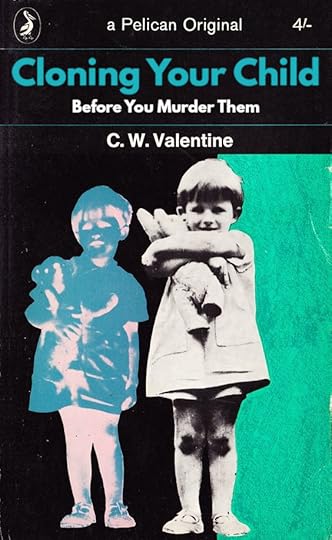
It’s a well documented fact that when I’m between projects or can’t write for some reason, I design book covers I don’t need. All of these were actual old covers that I simply modified to make a book that doesn’t exist, but should.
Here is part one of My Dystopian Library.

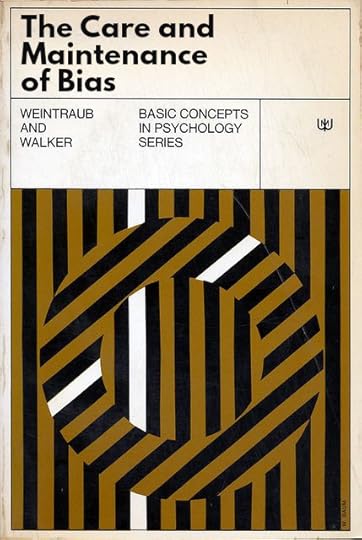
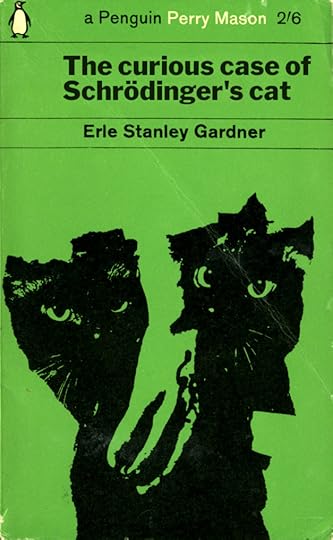
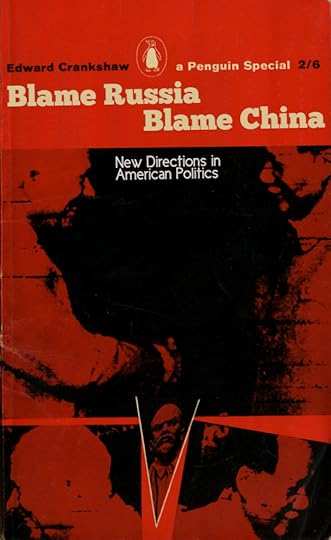
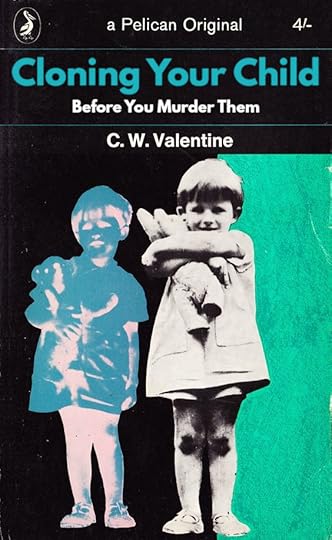
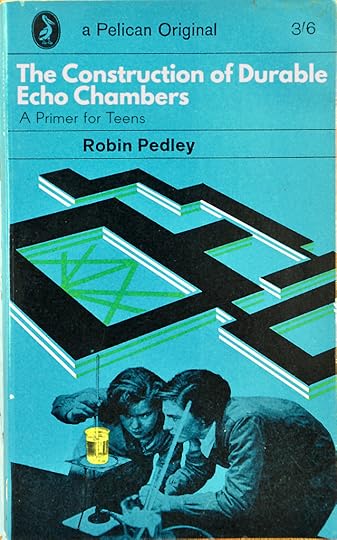
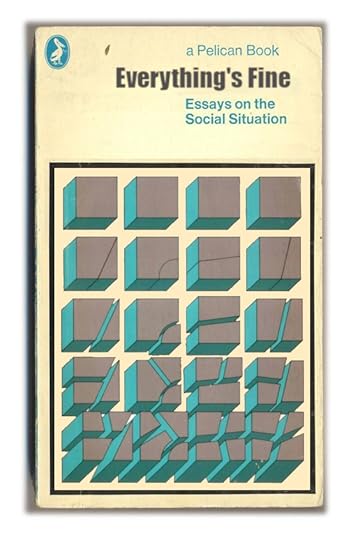
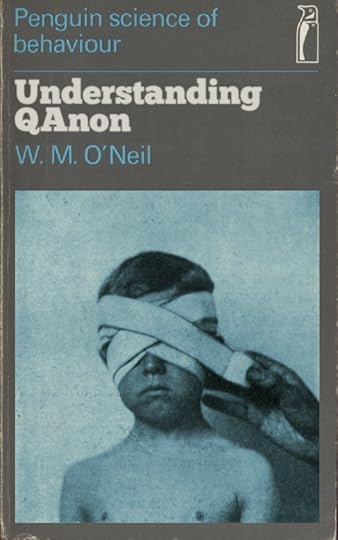
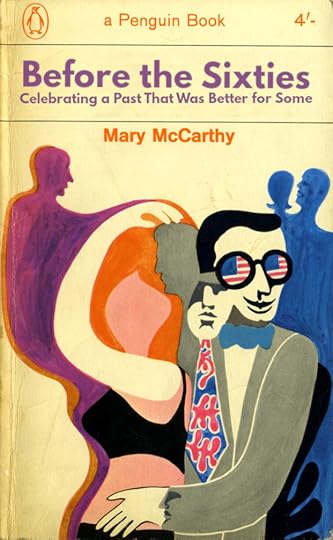

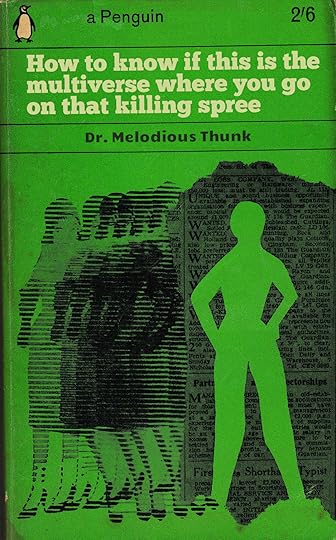

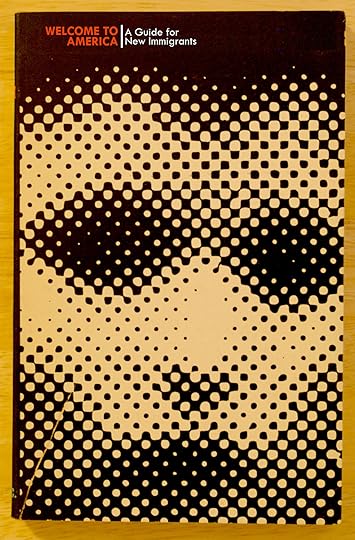
December 10, 2020
(Fiction) Kintsugi, the Broken Girl

The doctor’s eyes bulged from shock and asphyxiation as Mariko pulled the power cord taut. Her arms shook amid spittle and gasps, and she watched the frail man’s squirming tongue turn blue in his mouth. Then he went limp.
Mariko loosed the cord and Dr. Kuo’s bald head hit the floor. She turned to the sonogram machine, silent and dark, next to the examining table. He had seen it. And so had she. It was impossible. But there it had been all the same, shining in digital clarity. Dr. Kuo had removed the sonogram sensor from her abdomen immediately and said nothing, but it was clear from the look on his face that he had been just as surprised as she. It was also clear it wouldn’t be discussed—at least not with her. He turned away. He didn’t even acknowledge his surprise. Instead, Mariko knew, he would report immediately to Sato-san, her father’s waka-gashira, his trusted second in command, and the two men would decide. Mariko would be told later, after her father was briefed. When it was convenient for them.
She stood barefoot in the wood-paneled examination room and felt her shoulder twitch as if struck by the bokken of her old master. Even a dull wooden practice blade could deliver a painful blow to the nerve plexus at the base of the neck. That was the punishment for the slightest hesitation: a white hot shard of pain through her body. A warrior didn’t stop to think, her master would chastise her. When a sword was drawn or insult thrown, a warrior acted. Whether those actions were good or bad, honorable or not, would come from his heart rather than his head. If he was an honorable man, his actions would be honorable. And if he was a dishonorable man, he would be dead.
Dr. Kuo’s had barely had a chance to register movement before his patient yanked the power cord from the wall and wrapped it around his wrinkled neck. Cords and wires did a better job of muffling sounds, Mariko’s old master had taught her. Hands were bumpy. They grew slick with sweat. They slipped. It takes time to strangle a man, to use all the air in his lungs, and fingers tired. They let through little gurgles and tiny pleas. An assassin could never afford to be discovered. Weapons, like intentions, had to be hidden. A strong cord could be made to look like part of her clothing. It could be tied in a trick knot into her hair and pulled free in an instant. But Mariko didn’t have a cord. Inside her clan’s infirmary, where patients wore nothing but a simple robe printed with a heraldic crest, she could hide nothing. She was barefoot—nearly naked—and without thinking, she had grabbed the closest tool, and the frail Dr. Kuo fell dead.
Mariko stepped across the body and pressed her ear to the door. There was a nurse waiting outside for the procedure to be completed. Normally, she would attend, but no one was allowed to see the contents of Mariko’s womb. Often, not even her. Three doors down, an angry man was making a racket. He hadn’t stopped shouting since he’d arrived twenty minutes earlier. He’d been stabbed. He was bleeding and not happy about it. There were three others with him. If protocol had been followed, all of them would have checked their weapons at the door. But exceptions were often made when a man’s life was in danger. Mariko couldn’t be sure that the men hadn’t been allowed into the clinic still in their street clothes, weapons and all.
She looked down at her slender toes, then at her naked, tattoo-covered legs, and finally at the three small bumps under the skin of her inner thigh that revealed she was something more than human. She was scheduled for a full work-up that day, a complete rundown of her parts: mental, physical, biomechanical. Her clan was taking no risks with the 5.3 billion yen gestating in her womb. Her clothes, her phone, her weapons—everything—rested in a locker at the end of the hall, right next to the rack of cubbies that held the shoes of everyone inside.
Storming to the wall, she pulled open the drawers one by one. Gauze, bandages, cotton balls, antiseptic, syringes, intubation tubes, catheters—she stopped. She ripped the plastic off two small scalpels. They were tiny, barely four centimeters long, and looked ridiculous in her thin hands. But they would have to do.
She turned to the door.
I could scream, she thought. I could say Dr. Kuo dropped dead of a heart attack. I could shake and cry. Like the actresses on TV.
There were three waka-ishu, foot soldiers, attending the noisy man, plus at least another four up front. There were doctors and nurses and any number of other patients. After this morning’s unexpected attack by the Yamaguchi-gumi, the clinic was sure to be busy. There might even be a big boss here, locked away in one of the secret rooms. That would mean trouble. Such a man would have at least one bodyguard. Not street a thug like the men down the hall, but a trained killer. A ninja.
I could scream, she thought.
The nurses would come first. So dutiful. So attentive. Like good Japanese wives. Then the men would burst in and push the frightened women out of the way. Mariko would have to act hysterical. She’d never done that before. But then, how hard could it be? The big strong men would console her. They would lead her from the room while the other doctors bent over their dead colleague. It wouldn’t take long for them to realize he’d been strangled, not with his eyes bulging like that. Even Mariko could see the deep red ligature mark on his neck. She’d have half a minute, at most, while they conferred with each other. She was not a woman who could be accused lightly. Then they would call her back. They would answers. They wouldn’t hurt her. She was the daughter of the oyabun, the “father” of them all. But they would detain her. They might even drug her, if necessary. If she fought. And then they’d take her to Sato-san, who would look at her in silence with those bleak steel eyes.
I could scream, she thought. I could act hysterical. I could shake and cry.
Mariko’s shoulder twitched again under the phantom rebuke of her long dead master, and she clenched both her jaw and the tiny scalpels in her hands.
Fuck that.
She let the sleeves of her robe fall over her wrists to hide her tiny weapons. Then she slid the door open, slipped into the hall, and shut it behind her. The nurse outside was sitting upright with her legs tucked under her. She had perfect posture, and she gave a curt but deferential bow. Mariko returned the courtesy and told the woman that the doctor had asked for a moment. To say more might arouse suspicion, so she left it at that and walked casually down the hall in her bare feet. The doors to the other rooms were not made of rice paper, but they were made to look it, and she could see faint shadows move on the other side of the opaque plastic.
Her toes clenched the soft wood under her feet. She made it to the first corner before she heard the nurse scream. She stepped quickly, turned a second corner and was within sight of the lockers—and from there the steps to the front door—when the male clinic staff started shouting monosyllabic exclamations of shock in an attempt to rouse their coworkers. It didn’t take much. After that morning’s attack, everyone was on edge. The three waka-ishu, the street soldiers who had brought their wounded colleague, burst into the hallway before her. They wore sport jackets and matching pants with open collared shirts and no ties. They had guns drawn.
For a moment, they scanned the hallway, looking for the source of the disturbance. For a moment, they glanced right over Mariko, and she again thought she could act hysterical. She could start sobbing and run past them, as if fleeing in fear. That was her only hope of avoiding conflict. That she was the oyabun’s daughter counted for very little. Although the men were all superficially deferential, she was a woman and had no official status in the clan. She was neither waka-gashira nor waka-ishu nor even shatei, “younger brother.” She was imouto, “little sister,” a sort of servant-mistress, spared the latter duty out of respect for her high parentage—not that any of them would touch a woman with such a prominent facial scar. It was a novelty even that she’d been trained in ninjitsu. If it hadn’t been for the fire that killed her mother and drove her family to exile in Hawaii, leaving her the oyabun’s only blood heir, he wouldn’t have taken such careful precautions to ensure her survival. Not that she could take over. No, she was expected to give him a grandson. That was her purpose. Her duty. It was never spoken aloud. But it was clear to everyone all the same. And that meant her training—given over objections of her clan, for even an oyabun must honor the traditions—was primarily as a means of defending her womb, her purity, and her father’s honor.
And that gave her the advantage.
The foot soldiers of her clan, even though they were aware, in some sense, that she’d been trained by Hard Lotus Master, wouldn’t expect her to have taken it seriously, let alone excelled. They would be worried about hurting their “father’s” only daughter. They would go easy on her. Because in the end, she was only Kintsugi. The broken girl. That’s what they called her. All of them. Behind her back. She was never Mariko. That was too familiar. Nor was she Nishida-san. That implied respect. She was “kintsugi,” after the old practice, hardly seen anymore, of repairing broken ceramics with gold-dust lacquer such that they became beautiful in their imperfection. It was a great art, to be sure. But as an epithet, it referred less to her beauty than that it was marred by the long, diagonal scar across her face. The scar she’d gotten as a girl. The night her family estate was attacked. The night her clan was driven from their ancestral home. The night their long exile began, the exile that only ended when she was a woman of twenty. It meant she’d been broken and repaired. It meant she was damaged goods.
Mariko let the scalpels fall into her palms as she charged the three men, barefoot. If she could get close enough, quickly enough, their guns would be useless in the narrow hall. That she was a woman, Hard Lotus Master had taught her, was no excuse. Even men had to face opponents who were much stronger. She would simply have to apply the same tactics, attack not with strength but with dexterity and skill, using weapons rather than fists and striking where they were vulnerable, where their greater muscles were of no benefit—joints and pressure points, the eyes, the throat, the scrotum. But blocking a strong man’s punch would require too much of her effort. If he were very skilled, she would have to widen her stance and use two hands, which would steal her momentum and shift the battle in his favor. The point at which she began blocking was the point she had already lost and should retreat. Instead, Hard Lotus Master had taught her, she she needed to avoid their thrusts altogether. As a woman, she could be nimbler and lighter on her feet, and as his student, he would teach her to use stealth and dexterity to overcome any foe, to twist their limbs and use their own power against them.
She threw one of the scalpels. It flew past the closest two men and struck the third in the neck. It wasn’t enough to kill him, but it would hurt and draw blood, and he would step back, if only out of instinct, to make sure he wasn’t going to bleed to death. By the time the other two realized what was happening, she was upon them. Their guns were already drawn, but in those two moments of shock, she had closed the distance. She deflected the first man’s arm as his gun discharged. The bullet went wide and struck a nurse down the hall, who shrieked and fell as Mariko rammed the second scalpel into her attacker’s groin—right into his testicles. Shock and horror hit the man’s face and she pushed him back into the second, who yelled in frustration as his weapon turned to the ceiling.
Mariko kicked the second man’s knee, and it bent. But he was strong, and the blow didn’t send him down. She swiped the scalpel back and forth his arms, if only to cause pain, while the man with shredded testicles, crawled across the floor and screamed.
The third man, the one who’d taken the scalpel to his throat, came at her angrily. She spun and tripped him and sent him crashing into his companion, and both fell to the floor, which was just the opening the gathering crowd had waited for. Everyone came at her, and Mariko retreated from the hallway to the foyer, where she used a heavy brass display vase to deflect a bullet—the shock from which sent stabbing pain into her wrist and down her arms. If not for her enhancements, she would’ve dropped in pain.
Gripping the heavy handle near the vase’s neck, she used it like a club on one man, then another, following through with each blow, letting the momentum from each swing carry her into position for her next maneuver. The swaying forced her robe open, which she realized when the men attacking her flinched. She was the oyabun’s daughter. Not a common hostess girl. It was shameful to see her like that.
In their hesitation, Mariko struck again. She delivered the heavy metal vase across the temple of the largest man, who would be the biggest threat. Another grabbed her loose robe and she kicked off the wall, turned a swift cartwheel in the air, twisting his hand until he released his grip, which put him off balance, and she kicked hard in the gut. He went to his knees, and she round-housed him across the ear, slamming his head into the wall, where it left a round crater. She deflected another shot and the bullet struck a shatei, a “little brother,” just as he slid open a door to join the battle. He fell to the floor, motionless.
The men stopped.
Up until then, it had always been possible that old Dr. Kuo had been a pervert and had touched Mariko inappropriately. It wouldn’t have been the first time something like that had happened. But now it didn’t matter. Now the reasons for her betrayal were irrelevant. A member of the clan had been mortally wounded, and by one of their own—a woman at that. A woman who hadn’t immediately dropped to her knees and begged forgiveness. In such a circumstance, the clan’s duty was clear. Oyabun’s daughter or no, Mariko had to be stopped. By any means.
They came at her as a crowd.
“KINTSUGI!”
Everyone froze in mid strike. Everyone knew that voice. In seconds, the men dispersed, following the crowd of scared nurses at the back. There was no reason for them to stay now and risk dishonor. Or death.
Mariko repeated the name to herself. Kintsugi. The broken girl.
Damaged goods.
She knew the voice, same as the rest. At least, she thought, he hadn’t added the diminutive and called her “Kintsugi-chan.”
Mariko turned to face “Ichi”—The One. He wasn’t particularly tall, but he was athletically built with a full head fashionably-cut hair and a firm jaw. He removed his tailored suit coat, revealing the bright, starched dress shirt underneath. He folded the jacket and set it on the floor. He lifted his sheathed katana, a beautiful but simple weapon made according to the traditional art. He stood before her and said nothing. He didn’t have to. His meaning was clear. She was to submit that very second. Using words would have implied the matter was open to discussion.
It was not.
The pair were alone now, the foot soldiers and clinic staff having all retreated. No one would interfere. Not with this. “Ichi” was a renowned killer whose exploits had earned him his nickname several times over. There were few who could stand against him. It was even said he had faced the famed Black Ghost, the Yamaguchi-gumi’s legendary enforcer. But if so, “Ichi” never spoke of it. Not even when he and Mariko were laying bed together. She knew her opponent. She knew his skill. She even knew his real name. Kintaro Kenichi was not only handsome, he was a man of great inner beauty. It was that passion which led him to devote himself so wholly to his art, and to his clan. It was that passion which so attracted her, as both a teenager and a young woman. But he had never called her Mariko. To him, she was always Kintsugi. The broken girl. It was an apt name, he explained to her, not so much because of the scar on her face, which he had found perversely attractive, but for her time in exile. She was too rebellious, he said. Insufficiently respectful of tradition. Her time in America, he argued, had left a mark on her deeper than the strike across her face.
Mariko had no choice but to face him. If she tried to run, he would puncture her back, leaving her paralyzed and helpless—but with her womb intact. The katana, she knew, wouldn’t be the only weapon he carried. He would have darts and shuriken, at least, hidden under his shirt or tucked behind his belt. Mariko had nothing but an open, short-sleeved hospital robe that hung wide and revealed everything. Her breasts. Her thighs. Even the slight bulge of her abdomen.
Kintaro stepped in black socks to the fallen soldier and removed the man’s wakizashi—short sword—from his belt. It wasn’t as long as a katana, but it was certainly better than a four-centimeter scalpel. He tossed it to her and she caught it. He was letting her face him honorably. She doubted any other man in her clan would have shown her such respect. He waited a moment for her to change her mind. To submit. He didn’t expect it. But he gave her the choice. When she lowered into a defensive stance, he drew his katana from its scabbard. After half-a-breath’s pause, he gave a stout yell.
Their blades met, weakly at first, back and forth, as each warrior tested the other. “Ichi” probed Mariko’s body with his movements. Had she been hurt during the melee? Was she favoring one side or another? Was there a weakness? Could he disable her quickly? Finding none, his attacks gradually increased in strength and ferocity, where each of his swift and powerful blows—one after the next—were marked by a strong exhale, bordering on war cry.
At first, Mariko tried to match his strength, which brought the familiar, habitual twitch of her shoulder—a chip, Kintaro would say after sex. A weakness. She had been thinking again. Not acting. Her opponent saw it and she nearly lost her short blade. She recovered, but “Ichi” was driving her back with rapid, solid strikes. The point at which she began blocking thus, Hard Lotus Master had warned her, was the point she had already lost and should retreat. But there was no retreat. Not now. “Ichi” had been cleverer than her. He had gotten between her and the door and was pushing her deeper into the clinic, where there was no escape.
“Ichi” lifted her leg from under her with a sweep of his foot and she tumbled artfully, turning just in time to see him flick his wrist.
Three shuriken.
She dodged two by putting herself squarely in the path of the last, which she deflected with her sword as the other two hit the wall behind her. He was already coming at her. She saw the brass vase at her feet and stuck her wakizashi into the opening, did a cartwheel flip out of the path of his attack, and—when her feet landed—launched the vase directly at the man’s head. She followed it immediately with the sword, and then herself.
“Ichi” deflected the vase with ease and was barely surprised to see the short sword right behind it. He moved deftly just as it impaled itself in the wall behind him. Mariko’s weapon was momentarily useless. Anyone else would have been dead immediately. But Mariko knew Kintaro. She knew his inner beauty. She knew his passion. His duty. She couldn’t stop his sword. But she could deflect it down.
Kenichi Kintaro’s eyes went wide as he saw his strike move toward his lover’s pregnant womb, the womb that held his “father’s” grandchild. He had no choice but to turn his blade, leaving his arm open and exposed. Mariko struck with two hands, one above and one below, momentarily shocking “Ichi’s” forearm and allowing her to knock the katana loose. She grabbed it one-handed in midair and swiped while dropping to one knee. A woman with lesser training would have hesitated. But Mariko was no longer thinking. She was acting. As she had been trained. And before her conscious mind was aware, she had opened Kintaro’s belly.
His eyes went wide. He looked at her, his face red with pain and a deeply held breath. He let it out in one gasp. As shock subsided, resignation took over. And acceptance. Mariko saw no blame in her lover’s eyes. She had acted with fortitude. Whatever her reasons, he knew she believed what she was doing was right, that she was acting with honor, as was he. The pair had fought. And she had won. There was no shame.
The man called “Ichi” reached up and gently followed Mariko’s scar with his fingers.
“Mariko . . .” he said.
And then he died.
Kintaro Kenichi slid back and hit the floor. Mariko stared at the still body of her lover. She laid his weapon next to him. Then she bowed.
But there wasn’t time to mourn. When the sounds of battle ceased, the others would come. Mariko pulled the wakazashi from the wall and ran out the door.
The owner of the little produce shop across the alley-like street was a member of her clan, she knew, and she was sure he had a gun—illegal in Japan—hidden under the mounds of carrots and cabbages. A shotgun, probably, or a semi-automatic rifle, something that could mow down several attackers at once and give any clansmen inside the clinic time to defend themselves. Or flee. But if so, the man didn’t draw it when he saw her. Not because she was the oyabun’s daughter. That wouldn’t matter anymore. In fact, it only compounded her crime, for she brought shame and dishonor to the father of them all. They would only hate her that much more. She wasn’t shot on sight for one simple reason: she was pregnant. It had never been said out loud, but everyone knew. That was her purpose. Her duty. It was the reason she was kept close. It was the reason her body was off limits to the men. It was the reason she had to sneak away to see Kintaro. It was why the two of them never saw each other, nor even spoke, outside of the love hotels north of Ueno where they met twice a month.
Mariko had killed three men and wounded several others, some seriously. Her life was now forfeit. But what she carried in her womb was more valuable to her father than his very soul. There was no place she could flee where they would not come for her. No place in the world.
With no money, no plan, no family, and no shoes, Mariko ran down the street and slipped into the city. Her robe barely covered her breasts and left her tattoos exposed. Everyone would know she was yakuza. No one would help her. She was on her own. And they would hunt her now. Not just her clan, but their rivals, the police, anyone with a grudge. She knew her life was forfeit. But then, she didn’t have to escape. She just had to make sure the miracle was safe.
That was her vow.
cover image by Thomas Dubois
December 8, 2020
“Highly original.” “Entertaining.” “Thoroughly unexpected.” “Masterful.”
Click any banner for more info.
[image error]
[image error]
[image error]
[image error]
December 7, 2020
(Art) The Girl in the Glass Tube
All I know is, if you were a young woman between 1930 and 1960, there was apparently a worrying non-zero chance you’d end up experimented on inside a giant glass tube!
As a visual trope, the glass tube is both economical and efficient. It communicates multiple symbols at once. First is threat. The woman is imprisoned — but she is not imprisoned in a cage dangling over a pit of hungry alligators or strapped to a table about to be sawed in half. The glass tube evokes the imagery of science. She is not the captive of the mad brute — usually a foreigner trying to steal our women! — but is instead the toy of the mad scientist, who is intellectualism gone awry.
(Alternatively, it may be an alien, who is the mad brute/foreigner in sci-fi form. They represent invasion/decline from without. Intellectualism represents invasion/decay from within. Either way, only the potent virility of the hero, the antidote to both, can save her.)
The tube also resembles a display case, meaning that this variant of the classic damsel in distress makes it clear, probably more than any other, that the young woman is a sexual prize and the story inside the magazine is a parable about who gets sexual access to the females of the herd.
The glass tube is related to the earlier trope of the glass coffin, inside of which the virginal maiden, Snow White, is preserved in death until reborn by her lover’s first kiss, symbolic of course of the sex act. Despite that she is the protagonist of her story, it’s only by anointment with a penis that she becomes a woman.
[image error][image error][image error][image error][image error][image error][image error][image error][image error][image error][image error][image error][image error][image error][image error][image error][image error][image error][image error][image error][image error][image error][image error][image error][image error]
December 6, 2020
Cyberpunk and the State
I’ve been writing lately about how cyberpunk at 40 is becoming quaint and anachronistic but that most don’t see it because that’s the narrative of the future that most appeals. (There’s even a big computer game coming out.)
I wrote before how cyberpunk got cyberspace wrong that it’s not us who invade cyberspace but cyberspace that will invade us. It turns out as well that people are not lining up for voluntary amputations, and that the prostheses they choose are not made of chrome and neon but wood, ceramic, and rhinestones.
[image error][image error][image error][image error][image error][image error][image error][image error][image error][image error][image error]
One of the classic hallmarks of the genre is a breakdown of the social order and subsequent shift in the locus of power from the public sphere (governments) to the private sector (corporations). The belief that this has or will happen has become so widespread that it’s taken as a truism.
For one, it’s ahistorical. It suggests there was ever a time, in America at least, when large corporations didn’t exhibit inordinate influence on government,
-as if during the Ludlow massacre, the Colorado National Guard didn’t fire on striking miners and their families at the request of Standard Oil,
-as if the military-industrial complex that arose in the wake of the Second World War hasn’t been directing (or at least significantly influencing) foreign policy and war-making powers since,
-as if organized crime hasn’t been peddling election influence since forever. (Read the tales of Dashiell Hammett’s Continental agent, based on his years as a Pinkerton.)
The idea seemed to be that in the dystopian future, we would drop the pretense and corporate leaders would call the shots directly. In 1987’s RoboCop, for example, the company OCP literally buys the city of Detroit and runs its police force.
That hasn’t happened. China, for example, is using AI, big data, facial recognition, and the rest to create a total surveillance society that puts the worst cyberpunk dystopia to shame. Five of the ten largest companies in history are there. And yet, all are subservient to the state.
In the West, the big tech platforms are increasingly drawing public ire. Cambridge Analytica couldn’t survive the onslaught of public scrutiny. The US House of Representatives held hearings over the summer and just this week the president demanded the repeal of the infamous Section 230.
Arguably the closest we got to direct corporate control was the use of military contractors in the Iraq War. But they were sucking at the cash teat of the state, not giving it orders. Even Epstein was imprisoned eventually.
Eventually.
In fact, corporations — even very large ones — have seemed rather fragile so far this century. Enron disappeared practically overnight. The airline industry now, much like the auto industry in the wake of the financial collapse, is only surviving on government subsidy — versus the RoboCop example, where it’s the corporation that rescued a bankrupt government.
Again, that’s not to say large corporations don’t have inordinate influence in government. Of course they do. But that’s not at all new, nor is it anywhere near what the classic cyberpunk texts (including comics, games, and films) envisioned.
In truth, what we’ve created is not rule by corporations but something closer to William Gibson’s original vision — a new aristocracy, whose corporate fiefdoms are traded and lost in the digital battle for power among the 1%.
For the world’s biggest companies: https://www.forbes.com/global2000/#3fd9a24c335d
cover image by Benny Kusnoto
December 1, 2020
Cyberpunk as Retrofuturism
Cyberpunk and its offshoots (biopunk, solarpunk, etc.) are still our significant cultural vision of the future. And yet, it hasn’t aged particularly well.
This is the vid-phone from Blade Runner (1980), which was supposed to take place in Los Angeles this year.
[image error]
It does what most fictional tech does, which is update a device from the era, something the audience already understands (here, a 1970s pay phone) with a futuristic design — e.g., it’s a cylinder rather than a block.
But look at this beast. It’s got an inch-thick steel plate! That says a couple things. First, as hinted at by the dents and vandalism, it implies a kind of economic and social decay where the device needs to be armored against its users, many of whom will try to steal or destroy it. This device belongs to a fictional dystopia.
More than that, the plating says this device is expensive. Just look at it. It’s heavy, which means it’s a bitch to replace. And yet they’ve also enclosed it such that it’s not going to be easy to repair either, which further implies a slow pace of technological change. This device was built to survive in the field for ten or more years with minimal maintenance.
In truth, no one uses paid video phones because the technology has gotten so small and so cheap to produce that almost anyone can afford one that fits in their pocket. An actual public video phone would look like an interactive mall kiosk — light, plastic, and modular rather than heavy, steel, and monolithic, because if it gets damaged, its cheaper to replace than to repair it.
That doesn’t mean we don’t live in a dystopia. It means the real world isn’t bound by the rules of genre, which specify that objects and people must reveal themselves by appearance. The criminal mastermind has a big head. His dull henchman has ham-fists and a heavy brow. The fat character is always funny.
Part of the reason smart phones are so cheap is that they’re data-gathering devices for surveillance capitalism. I’ve said for years (non-ironically) that Orwell was an optimist. He assumed the government would have to mandate cameras and listening devices in our homes. In truth, we happily pay for and install them ourselves without being asked.
There’s nothing that says a dystopia has to be dark and brooding. In fact, the creators of a genuine dystopia have a vested interest in making everything appear as light and happy as possible. Ironically, there’s a certain naive optimism in Blade Runner, and cyberpunk generally, that it assumes the world and its masters will reveal themselves so readily.
Retrofuturism is a movement in the creative arts showing the influence of depictions of the future produced in an earlier era. If futurism is sometimes called a “science” of anticipating what will come, retrofuturism is the remembering of that anticipation.
Wikipedia
A classic retrofuturistic example would be pneumatic tubes, like at the bank, which use air pressure to propel a canister or other object along a track. I remember reading an article in a magazine from the 1930s that suggested in the future, you wouldn’t have to go out to get the newspaper or wait for it to be delivered. News and information would be piped directly into your home, along with other movable goods, making the picture below a 1930s server room.
[image error]
In one sense, that’s not wrong. News and information are piped to darn-near every household in the world. But not by shooting a folded newspaper through a metal tube. The author understood the trend but had difficulty imagining the technology.
And it isn’t the wireless transmission part. Radio was extremely popular in the ’30s, and the telegraph had been around for more than a generation. Rather, it’s the screen. Information has to be displayed on something, and in the days before TV, even if you knew or guessed that screens were coming, it would be hard to imagine Apple’s hand-sized retina display coupled with a ubiquitous high-speed data network would ever be cheaper or more widespread than print.
To be fair, suggestions that society would be immanently paperless have repeatedly turned out to be wrong. As any amateur futurist will tell you, it’s not the linear trends that make prediction hard. It’s the intersections.
We don’t like to think of ourselves as “retrofuturists.” As occupiers of the present, we are subconsciously aware that our vision of the future is the most advanced to date! But of course, it will age, which means even our advanced conceptions will elicit a chuckle from our grandchildren. We, too, are quaint.
Take the neural jack, that ubiquitous sci-fi man-machine interface. In the future, it will look as ridiculous and barbaric as sending newspapers down pneumatic tubes under the street.
It didn’t start off that way. Sci-fi author William Gibson, who invented the term cyberspace and was the first to seriously imagine it, had his characters access the global digital network via electrodes on their heads. It was the sci-fi film directors, needing a strong visual portrayal of “jacking in,” that once again copied existing technology, something the 1980s audience was already familiar with: the headphone jack.
It’s also symbolic. There’s something mesmerizing and horrific about the insertion of a metal probe into the body, as in that famous scene from The Matrix when Neo wakes up in the reactor and discovers the I/O port in the back of his skull.
It is simply not possible to put a jack anywhere on the body that will act as input/output to the central nervous system. In the case of The Matrix, you could perhaps claim the machines bred humans to be I/O compliant, but the fact that Morpheus and his team surgically remove the devices later suggests otherwise.
[image error]
Even co-opting the spinal cord and all 12 cranial nerves, which mediate experience between the brain and body, wouldn’t work as advertised. For one, they’re all spread out. The optic and olfactory nerves are behind your face. The pair of vagus nerves run through your central cavity.
You could intercept the cranial nerves of course and run wires to a central port, but that would be incredibly invasive and require numerous surgeries, even in the future, which immediately means it would never be widespread. And even then, it still wouldn’t work. There is no “output” wire from the visual cortex, for example. There is no “input” wire to the brain stem, which mediates heart rate, temperature, the sleep/wake cycle, and a host of other essential functions the machine would need to access.
If you threaded microscopic wires throughout the brain, you would only capture the firing of individual nerves or clusters, and you would need a second, virtual brain on the machine-end to put it all together, which raises the question of which of the two parallel consciousnesses was really in control of anything. (Talk about a nightmare. Who would volunteer for that?)
Then there’s the fact that a lot of our core bodily functions, such as almost anything to do with sex, are not mediated by wires at all but by glandular secretions. The mammalian body is simply not machine-ready.
We can already control basic computer functions with a combination of electrodes and eye movement. I suspect we’ll control computers with our “thoughts” noninvasively in that way, just as I suspect very few doctors will be willing to chop your arm off and replace it with a prosthesis. It’s much more likely that we’ll enhance ourselves with removable devices like sleeves and exoskeletons.
What about cyberspace?
There will be virtual realities of course, but the global digital network is not going to remain a separate world unto itself, which not even Mr. Gibson foresaw (originally).
Again, it’s the intersection of technologies that makes prediction hard. When Neuromancer was written, the world was fundamentally wired. The telecommunications revolution means that the digital world is untethered. We will not invade it as hacker-adventurers. It will invade us, as games like Ingress and Pokemon Go have already shown.
We will increasingly overlay our digital realities — walking or driving directions, advertisements, animations, video calls, web pages, pop-up menus — onto the physical world, separating us further from it, and when the physical world doesn’t comply with our needs, we will alter it through gene editing and micro-fabrication technology.
Ultimately, bits will control atoms and the physical world will become an extension of our minds rather than the other way round, which makes cyberpunk yet another quaint anachronism, like the old Buck Rogers strips.
It also means, paradoxically, that every quaint vision, from Buck Rogers to Battlestar: Galactica, will eventually exist somewhere as the word made flesh.
cover image: “Zygote Market” by Eddie Mendoza
November 29, 2020
(Fiction) A Cackle of Murderlings [NSFW]
Erasmus stuck Zen-ji at the top of the grand staircase for good reason. A ten-foot samurai in full armor, meditating cross-legged on a large dais: that sent a clear message—that, and the man-sized sword that lay in front of him.
Jack had never seen Zen-ji speak, and in all his comings and goings through the years, Jack never saw him turn his head, or cough, or go to the bathroom. But Jack had seen him move, three times in fact.
The first had been for Johnny Two-Brain, so named because of some fantastically poor decisions he’d made with his penis, the last of which was to screw Jenny Diamond, whom Erasmus was sweet on. Not that anyone knew. Zen-ji separated the two brains, along with the right and left halves of Johnny’s body, in what had to be the fastest surgical transection in history.
Jack and Johnny had come up together, back in the cowboy days when Freecity was a lot smaller and the Empire a lot further away and everything was up for grabs. They weren’t friends, but they were friendly. Still, all Jack could think about as he watched the two halves of Johnny’s surprised face fall in opposite directions to the floor was how sharp that massive sword must be, and how strong its wielder, to make a cut like that.
Jack technically didn’t see Zen-ji’s second move. The lights were out. But he saw Mortimer Pendergast sitting in a high-backed chair in the boss’s office, smiling at Erasmus. Morty ran the Dark Red, Erasmus’s secret of secrets: an underage brothel, mostly teenage boys from the streets or local orphanages that Pimpernel patronized through his various philanthropic organizations.
The boss had caught Morty fronting on the side, but Morty wasn’t pimping. He was extorting. He had been blackmailing a famous artist who frequented the club. Morty had pictures of her in bed with two and three teenage boys at a time. She was famous and married and in good with the Imperial crowd. She was only too happy to produce high quality forgeries of some of the lost greats. Her crown jewel was a replica of Waldorff’s Seventh View of the Falls from the Great Sewer, which Morty sold to an aminal collector for a few hundred thousand.
Morty claimed he had inherited the art collection from his great uncle, who had been a rogue cartographer and frontier trader back before the Empire shut the border. But Erasmus was the king of liars, and he wasn’t having any of it. He pretended to laugh at Morty’s ingenuity, and Morty knew it. He must have had a hunch what was coming because, even as he laughed at the absurdity of it all, the carpet under his seat grew dark with his own urine.
The two were yukking it up good when Erasmus switched out the lights. Jack heard the sound of movement through air and the crack of wood. When the lights came back on, it looked like someone had shoved a log through Morty’s chest. There was a foot-wide hole in the back of the big chair. Zen-ji had focused on the man’s heartbeat in the dark and had speared him clean through, furniture and all.
The third move came on a rare occasion when the samurai’s dais was inside Erasmus’s office. The boss had wanted to get a picture of the Doutee Gang—Chester and his cousins—who’d come over from the other side. They’d been running some two-bit protection gigs out in the hills surrounding the city. Stupid hicks milking poor dairy farmers. Erasmus had them line up in front of an old beast of a camera, tripod-mounted like a machine gun. Of course Erasmus fucked with them first, moving them around, changing their order, asking one person to sit, one to stand, and finally all to stand in a row, some on boxes to even their heights “for the picture.” And all the while their faces were beaming, drinks in hand. “Fancy liquor,” they said. They probably drank moonshine.
It was a test. Erasmus wanted to challenge the samurai, to see if Zen-ji was faster than the camera. And it was a daredevil’s gambit. Five heads in one blow. One of them rolled near Jack’s feet. “Fancy-drinks” Chester was so tense for the picture, his body stood headless for two minutes, clutching that highball like it was the last he’d ever have. Jack stood in the corner as the rest of the crew bet on how long it would take to fall.
That was the last time anyone came over from the other side. After that, everyone knew. You either worked for Erasmus Pimpernel, or he’d fucking kill you.
Erasmus couldn’t wait for the film to be developed. It was all he talked about for days. Jack never asked which was faster, shutter or samurai. Jack may have been the most prolific of Erasmus’s Murderlings, but Zen-ji was the most efficient. Three moves. Seven kills.
Jack stood in front of the giant with his hands in his coat pockets. It was impossible to tell if Zen-ji’s eyes were open under the large, curved helm. It shrouded all his features. Not that it mattered. A trained Japanaman could spear your heart just by fixing on the sound of it beating. Jack had seen it.
Not that Jack had a heart to spear, but there was plenty clicking in his chest.
The guys at The Dive said the same as LaMana—Jack was still alive because Pimpernel couldn’t convince anyone to take the hit. But Jack knew better. He was looking right at him. Erasmus was patient when he wanted to be. He had his own reasons for leaving Jack alive.
“Jack!”
The gunslinger turned and walked toward Zeek, who stood outside the doors to Erasmus’s chambers. Zeek had switched sides. She’d been born a man, but she now enjoyed life the other way. Her make-up clung like a mask to her face, plastered thick to hide the five-o-clock shadow. Her dress was dark and matronly and covered everything up to her neck. She kept everything running. She held a leather-bound book in one hand and thrust the other out.
Jack clenched it in greeting.
“Good to see ya, Jack. Been a while.” Her words were thick with meaning.
Zen-ji, on his dais, didn’t move.
“Jack!”
Jack turned to see Ruud sitting on a couch inside the plush waiting room, wood-paneled and window-less. Art hung from gold frames. An inverted glass dome bulged overhead, revealing the large aquarium above. Jack knew it was rigged to explode and flood the place if the building were ever raided. Somewhere up there was a sixty-five-foot squid, the main attraction of the carnival that fronted most of Pimpernel’s illegal activities and under which he had built his subterranean headquarters.
Jack shook Ruud’s hand. He was an effete man with slick hair and a pencil-thin mustache, good with a stiletto, and Erasmus’s go-to society assassin. Jack could never blend with socialites. The boss always sent him to the gutter.
Ruud didn’t get up. “Long time, no see.” He nodded to the next set of double doors. “He’s with the girls, but we’re supposed to send you right in.”
“You sure?” Jack looked at Zeek. He knew what happened to guys who interrupted Erasmus’s private time.
Zeek shrugged. “That’s what the man said.” After Jack started walking Zeek added, “But I wouldn’t go in there.”
Ruud chuckled.
Jack nodded and opened the double doors.
Erasmus Pimpernel was out of his mechanical spider. The glass capsule that held most of him rested in a solid gold dish designed to dangle his spinal cord over the gilded tub. A young girl, wet and naked, sat in the tub sucking on the stubby end of his cord, which hung like a limp dick out of the last of his broken vertebra.
“Oh fuck . . .” Erasmus moaned. “Oh, Jack. Oh Jack, just a minute. Oh . . .”
Most men would have been dead if they’d walked in at that moment. But then Jack wasn’t a threat. He stood motionless. There were two more girls in the tub, also naked, and they smiled at him. Jack figured they couldn’t be older than nineteen or twenty, and all flesh and blood. The boss left the mechanoids for the club.
The working girl held Erasmus’s rubbery cord with one hand and diddled the frayed ends of his spinal nerves with the other, running it up and down the vertebra like she was petting a cat. The glass helmet that held the brain clinked rhythmically against the gold dish as she sucked, and the motion caused the two eyeballs in the tank to sway back and forth. Both were lidless and round and attached to spinal nerves that disappeared into the brain. The left eye was frosted and gray.
“Damn Jack, you see this?”
Jack just nodded. Girls number four and five were clothed and sitting at the bar on the left. They must have the night off, he thought.
“Stop. Stop.” Erasmus called. “That’s enough. Fuck. Put me back.”
The girls in the tub stood up. Jack saw the water run in rivulets down their bare skin. Each girl was a different complexion. The boss liked variety.
“Hurry up,” he chided.
The girls lifted the little glass-helmed brain out of the dish and fed the loose spinal cord into the middle socket of the spidery contraption. The metal collar around the base of the brain, which held the voice box, clicked into place and the mechanical spider’s legs wiggled to life. With the capsule attached, it looked like a virus.
“Jack!” Erasmus exclaimed. “Goyen in heaven, Jack. It’s been forever. How you been? You want a girl?” Erasmus laughed. It was a rhetorical question. “You and me, Jack, you know, we have a lot in common. Always did.”
“Oh?”
“Two things, Jack.” The mechanical walker moved across the room, past the chairs, toward the desk on the far side. “There are two things that will ruin a man. Know what they are?”
“Nope.”
“A dick and a heart. Ain’t that right?”
“I suppose so.”
“You and me, we got neither.” Erasmus moved behind the desk and settled into place. “Nothing’ll get your ass into trouble faster than a fat prick hanging between your legs. Guys with small dicks, they don’t like whipping it out. Don’t want people to see, ya know? They’re ashamed. So they’re always real careful because they’re always worried.”
“Right.”
“But a fat prick? That’s a beauty. You got something like that, you wanna show it off. Know what I mean?”
“Not really.” Jack stood in front of the guest chairs. They were new, or at least Jack hadn’t seen them before. He wondered who had died in the old ones and how many sets Erasmus had gone through in his absence.
“I used to have a big dick, Jack. A fuckin’ monster. You know that?”
“Nope.”
“Took three or four women to tame that dragon. Shit, these days I can’t handle more than a few minutes with Cyndi before I turn to jelly. Ain’t that right, baby?” Erasmus called.
She smiled from the bar. The girls were drying themselves and whispering, probably about Jack. The Jackrabbit. Black Jack the traitor.
“But look at me now,” Erasmus went on. “What’s a guy gonna do?”
Jack looked around. Other than the two up front, the entire compound was empty. It was surreal. Erasmus’s offices were usually bustling. “Where is everyone?”
“Shoveling LaMana’s shit.”
“What happened?”
“You didn’t hear?”
“Hear what?”
“Have a seat, Jack. We need to talk.”
Jack stepped backwards to a chair.
“LaMana’s dead.”
Jack paused for a moment before lowering himself into the finely upholstered seat. It creaked under his weight.
“Shit, don’t sit there, you asshole. That chair’s an antique. You weigh like eight hundred pounds. You’ll break it.”
Jack decided to stand.
Erasmus watched him. Every one of Jack’s movements was slow. “How you movin’ these days?”
Jack couldn’t stop himself from glancing at the floor-to-ceiling painting of Riming Temple hanging to his right opposite the bar. Erasmus’s vault was behind it. Jack glanced and looked back in an instant. “Oh, you know . . . winding down.”
“I bet.”
There were a few moments of silence. Erasmus was making it clear he wasn’t going to get the key.
“Damn, it’s good to see you, Jack.”
“Was it a hit?”
“What?”
“LaMana. Was it a hit?”
“It was a fuckin’ Fury.”
Jack scowled. It didn’t make any sense.
“Zeek will tell you all about it. I need you to take her to see Pugs.”
“You collecting the books?”
“You’re damned right I’m collecting the books. That little two-faced aminal works for me now, whether he likes it or not.”
Jack raised an eyebrow. “Does he know that?”
“You’re gonna tell him.”
Jack raised both eyebrows. “He might take exception.”
“Who the fuck cares?” Erasmus screamed from his voice box. “That little rat-dog is a venereal stain, a shit streak on the underpants of the world! You hear me? You get Zeek, you go to that herpes pit Pugs calls a club, and you tell him. You don’t ask. You tell him. Erasmus Pimpernel owns him. I own him and his goddamned books. You get those books, do you hear? You don’t walk out of there without them.”
Jack nodded.
“Do you understand what I’m saying? You don’t come back without them.”
“It ain’t my first rodeo, boss.”
“Yeah, well I know what happened on your last rodeo, don’t I?”
Jack didn’t flinch.
“Don’t I?”
Jack nodded.
“Goyen-damned fucking right, I do. But that isn’t going to happen again, is it?”
Jack turned to leave.
“And then we use the key, Jack. After.”
Jack stopped. He nodded.
“And I want Rosa.”
“Don’t have her.” Jack shrugged.
“Don’t give me that bullshit.”
Jack stood straight and silent. He looked right at Pimpernel.
“Well, where the fuck is she?”
Jack shrugged. “Gone.”
“Whaddya mean gone?
“Just gone. Been gone, ever since that night.”
Erasmus thought for a moment. “That’s a damn shame. A real damn shame. You were a wizard with her. Unstoppable. A regular one-man army.”
Jack didn’t say anything.
“I mean it.” Erasmus’s voice was softer now. “You were something else, Jack. A fucking god.”
“Don’t believe in gods.”
“Who? You or me?”
Jack scowled and started to walk out.
“Jack?”
He stopped.
“We missed you, Jack. I missed you.” The little voice box let out a mechanical sigh. “I miss the old days, Jack. I miss whiskey and fucking and the feel of a man’s throat in my hands.”
Jack gave a nod. “Good to be back.” He walked out of Erasmus’s office and back into the gilded hall without saying a word. He nodded at Zeek and the pair walked down the grand staircase. Jack didn’t speak and he didn’t look back, but he felt the samurai’s eyes follow him out the door.
Selection from my first novel, a deliberate study in jumping the shark, in which I tried to offend literally everyone.
image by Adrian Bobb
November 27, 2020
On Perversion
Pervert can be noun or verb. When we pervert something, we alter it from its intended course — we distort or corrupt — while a pervert is the thing distorted or corrupted.
As a noun, pervert has both a strong and weak form. The weak is often self-applied. I often refer to myself as a pervert, which is true. The strong form is usually screamed and followed by a hasty exit.
Some people think homosexuality is a perversion. Some people think masturbating to hentai is as well. Or coprophilia.
There are pictures on the internet of people having sex while smeared in each other’s feces. I’ve seen them. I’m not sure it’s the shit in itself that arouses them as much as the breaking of a strict taboo. In that sense, coprophilia is no different than erotic asphyxiation, or skydiving: we are excited by illicitness and danger.
Unfortunately, disgust triggers fear and thence bigotry. We fear the perverted because they live in the wilds.
We are each at the center of a circle. Inside that circle is everything we find rational and reasonable. Outside that circle is everything else. When someone admits to being aroused by human excrement, or animals, first there is disgust, then aversion — because if that person can indulge such a thing, if they transgress the boundary, then my God, who knows what else they might do??
Anything outside our circle is not simply unknown. Because it’s unknown, it seems irrational and unpredictable. Hence, bigots often see perverts as subhuman, something closer to a lion or a snake, where we stand wary because we’re never quite sure what the beast will do next.
Disgust also implies contamination and therefore contagion: corruption spread by contact. And then we’re back to fear — that contact with homosexuals will turn a child gay, for example.
What makes bigotry facile is the utter arbitrariness of the circle. Did you know, for example, that when the pilgrims first came to New England, they were completely disgusted by the foot-long insects that trawled the beaches in great numbers? These days, a good Maine lobster will set you back $35 or more.
In my lifetime, sushi has gone from being an object of disgust to one of the most popular foods in the Western world. Incidentally, gay people can now get married.
I am not a homosexual, but I am a pervert. That I am on occasion aroused by the obscene does not make me any less rational. I am no more likely to steal or commit murder or run around with my genitals covered in bullet ants than most people.
In fact, in my experience — and Jung’s — those of us aware of our demons, who acknowledge them and keep them on a short leash, are the only ones possibly in control of ourselves.
It’s all you fools who pretend to have none that worry me.
November 26, 2020
(Fiction) A Minor Exorcism
He was making a proper nuisance of himself, whoever he was. I could hear the screams from the street. I stepped from the car and met the officer in charge, a woman named Ballantine. I didn’t know her, but I’d seen her around—at PEA meetings, I think, back when they still thought I might make a good role model for the junior officers. She had a potential shooter upstairs but seemed more terrified at the immediate prospect of having to explain why I’d been summoned in lieu of SWAT.
“Thanks,” she said, extending a hand in greeting.
“Sure, sure.” I looked up at the building. The fire escape zigzagged down all six floors of the brick facade. Window-mounted AC units stuck out like bit tongues. “What do we got?”
“I know this isn’t really your thing, but—”
“It’s all right. Usually by the time I arrive, there’s already a stiff. Nice to get out in front of one for a change.”
“Luckily, we have him isolated. Before there are pictures of us charging in, guns blazing, on the evening news, I thought we should at least try and talk him down. Word is, you speak this guy’s language, if you know what I mean.”
The yelling resumed and she led me in silence to the door.
“And what language is that exactly?”
Ballantine led me up the stoop. “One of the patrolmen is the son of a rabbi. He said it sounded like Aramaic.”
“Do people still speak Aramaic?”
She shrugged. “This guy does.”
Another bout of shouting filled the foyer as we entered. Mailboxes were on the left. Stairs were on the right. The super’s residence was at the back. Somewhere not too far away, a baby was crying.
“Fifth floor,” Ballantine said, making it clear she wasn’t coming. The noise was louder inside, and she had to raise her voice. “The sarge is up there. Fair warning. He’s not real good with female officers.”
“And the family?”
“Taken away by ambulance. Father, mother, adult daughter.”
“Hurt?”
“No.” The sounds stopped again and her voice fell to a whisper. “Just really shaken up. The mother has some kind of illness, I gathered. Supposed to be serious. The ambulance was mostly for her. The other two went to make sure she was okay.”
“Anyone else in the unit?”
“Just the evil spirit.” Ballantine smiled in jest.
I started up the stairs, four flights to the top. The yelling came and went and got louder around each turn. Residents, who I’m sure had been directed to stay inside their homes, peered from behind cracked doors. As I passed the third floor, I felt a pulse hit the inside of my skull and leaned against the wall for a moment. I pressed my palm flat against my temple. I smelled cumin and coriander. On the fourth floor, I smelled new carpet. The scent itself was pleasant enough, but I figured it was a mixed blessing for the tenants who had to wonder, as I did, what had happened in one of the units that was serious enough to leave the landlord of that place no choice but to spend the money.
A patrolman was crouched against the wall on the final landing, just below the fifth floor. He looked to be about half my age. I removed my firearm, holster and all.
“Hold this.”
He looked at it. “You know he’s armed, right?”
“That’s what they said on the radio.” I kept the weapon extended.
He looked at it. “Your funeral.” He took it with a shrug.
“Just follow your damned orders!” The uniformed sergeant at the top of the stairs barked down in an urgent whisper.
I walked up as the screaming started again. Our guy was in 507. He was pissed about something and letting the whole world know. Language definitely sounded Semitic, like Arabic or Hebrew, with lots of soft consonants and recurrent syllables.
I stood close to the sarge and kept my voice down. “How long’s he been in there?”
“Not sure.”
The man’s name tag said Rollins, and he was as haggard as you’d expect for a man who remained a sergeant into his late 50s. His ruddy jowls had started to sag, along with his uniform, but he had hard eyes that I suspected had gotten harder every year. He used them to glance over me. Nothing sexual. Just checking me out, deciding if I was up to snuff.
“Few hours maybe,” he said. “A few of the residents mentioned they heard sounds of fighting a little after lunchtime. Walls here aren’t real thick, in case you haven’t noticed.”
I heard the baby cry again, fainter this time. “Shouldn’t we clear the building?”
“Headquarters didn’t want to cause a panic,” he said sarcastically.
I nodded. “We have an ID?”
He shook his head. “Supposed to be some kinda faith healer. Family’s from Nigeria or Ghana or some shit like that. Wife had meningitis and they brought this asshole in to take the evil spirit away. Then he went nuts or something. I don’t know.” He squinched the side of his face like it was all a bunch of hooey.
“You been inside?” I motioned toward the half-open door just down the hall.
He nodded in the affirmative.
“Any mirrors?”
“Mirrors?”
“Yeah,” I said. “You know, reflective glass. Shows you what you look like.”
He scowled. “Didn’t notice. I was too worried about the raving asshole with the gun. And getting the family to safety.”
“What about a TV?”
He thought for a second. “Yeah. Flat screen in the living area. Why?”
I took off my sport coat and tossed it over the balustrade. It would only constrict me if there was a tussle. I unwound the chain on my wrist, the one dangling the little silver talisman, and fastened it around my neck like an ordinary necklace. The chain was visible but not the carved silver disc, inlaid with a drop of polished obsidian, which hung below the line of my dress shirt.
“You sure you’re gonna be okay in there? Patrolman Meyers is an ass,” the sergeant said, motioning to the kid holding my gun, “but he’s not wrong. Guy’s got a gun.”
I nodded as I rolled up my sleeves. “Just keep everyone back. No matter what you hear. No matter how crazy it sounds. Alright? Keep the trigger fingers out until you hear from me. You’ll only make things worse.”
“Whatever you say, Detective.”
He was being sarcastic again, but I didn’t care. Sgt. Rollins had the demeanor of a man who knew how to keep control of his men, which is all that mattered. I trusted him—in a way. I trusted that after two and a half decades on the force, he would do everything he could to make it the last few years to retirement. He wasn’t going to play hero.
I stepped lightly to the door and peered in. The guy must have caught sight of me, because he started screaming again in that unusual tongue. Now it was the same phrase over and over, like he wanted me to do something—get back, maybe. Or let him out. He was on the floor in the living room kneeling near the inside edge of a large, heavy salt ring. He definitely had a gun, but judging from how he held it—by the barrel—may or may not have known what it was for. I pushed the door open slowly, my body turned in profile to make myself less of a target—just in case. I took a step and waited for a reaction. There was a closet door to my right and a small enclosed kitchen to my left, where a light was flickering randomly. There was a couch and a tall potted plant across from the worn Ikea bookcase next to the TV. There was a slider door at the back, bolted shut. And no balcony.
Only one way out.
The room had bright, colorful African decor. A zigzag-patterned rug had been rolled up and put out of the way, probably to make room for the salt. An open thirty-pound sack of the stuff sat next to the TV stand, topped with an inverted steel funnel. The ceiling glistened slightly as if covered in a thin layer of sweat. A few drops ran down the walls.
The guy inside the ring was clearly African. He wore a white kufi cap on his head and matching gown. There were dots of white pigment across his cheeks and brow. His right hand gripped a Smith & Wesson .38 revolver. He was white-knuckling it. His left hand held a wooden figurine.
He yelled again and shifted his grip on the gun. It went up, properly this time.
There went that theory.
I opened my hands and arms wide. “I’m not armed.”
He uttered what I’m sure was an insult—terse and angry. His voice didn’t quite match his body. Too deep. And there was a slight lag between the sound and his lips, like a soundtrack just a bit out of sync with the film.
I pulled my eyes from the gun barrel pointed at my chest and stole a quick glance at the earth-stained figurine in his other hand. It was about a foot tall and shaped like a fat peg or stake. He gripped it by the tapered end, which wasn’t needle-sharp but definitely wasn’t dull either. The top and center of the piece had been carved to resemble a head and body. The face had a simple, snarling visage. There was a thin, angular chain wrapped five or six times around the torso. It was the color of cast iron and looked hand-made. No two links were the same size or shape. Dangling from one of them was an open padlock, also cast iron. I guessed it was a spirit totem of some kind. I hadn’t seen one like it, but the symbolism of lock and chain are darn-near universal.
“Who’m I talking to?” I asked as I shut the door behind me. I reached back and locked it without taking my eyes off the man.
He laughed desperately. His dark skin had the kind of crosshatched wrinkles you get after a life in the sun, especially at the corners of his mouth and eyes, which were crazy bloodshot. But under that, he looked like someone’s thin, aged grandpa.
“So what do I call you?”
He laughed again, longer and louder. He wasn’t stupid enough to tell me his real name, which is the easiest way to bind an entity. That’s why all the old medieval texts had three or four names for every “demon.” It was a ruse on their part to evade capture. Most of them weren’t true demons, of course, just plain ol’ malignant spirits, like this one—opportunists, for the most part, no different than a vulture or a coyote, and just as skittish, easily frightened by guardian statues and sacred objects. Most tend to hunt at night, when the pickings are easier. As long as you had the right tools, they’d usually flee and take their chances on an easier target. But this one hadn’t. Best guess, the witch doctor had managed to get the bastard out of the sick wife but something went wrong and he couldn’t lock the chain in time. Maybe his hands shook. Maybe the lock was stuck. Who knew?
“What do you want?” I asked.
His bloodshot eyes glanced to the salt ring.
“Well, see, that’s a problem.” I took another step forward.
He cocked the revolver calmly and deliberately. I heard the click in the now-quiet room. I had the sense that everyone in the building was holding their breath, trying to hear our words, which I’m sure rumbled through the thin walls as an undecipherable baritone.
I looked at the gun barrel. I was very aware that at that range, there wasn’t much chance he’d miss and that any hit had a decent shot of being fatal—or at least making sure I had to shit into a bag for the rest of my life. At least the old shaman had made a good-sized salt ring—not just wide but thick as well. That, plus the protective dots under his eyes, suggested experience. Pouring a ring like that takes a lot of salt and a lot of time and is a bitch to clean up after. Folks who don’t know any better read the instructions in a book and think any old ring will do. They use half a box of Morton’s, make a thin circle barely big enough to move in, and call it a day. But all it takes is one misstep to scuff a ring like that, and then it doesn’t matter how good you are. It’s game over.
This guy had played it safe. He knew not to take chances. But then, he also hadn’t been too worried. He’d used a salt ring rather than something durable, like a painted conjuring circle with binding runes. That said to me he’d probably done simple exorcisms all the time back home, wherever that was, and hadn’t expected this one to be any big trouble.
It was a mistake—one I wasn’t going to repeat. I needed to know what I was up against.
I kept my arms open and nonthreatening. “You can shoot me if you want. I can’t stop you. But if you do, my friends are gonna shoot back.” I nodded toward the hall. “I’ll be dead, and so will that man you’re in, which means this whole place will turn into a crime scene and no one will touch anything until the forensics guys get here, which could take a while, especially since we’re coming up on rush hour.”
I nodded to the round plastic clock on the wall, just over the TV. I didn’t need to. I knew what time it was. It was just an excuse to glance down at the blank screen and confirm, up close, my suspicion that the two of us were alone and that the man’s reflection matched his appearance. Which it did. That ruled a few things out.
Easier things, unfortunately.
I took another careful step forward. I wasn’t more than ten feet from the ring by then.
“You’ll be trapped in that circle,” I said “for hours, unbound and without a host. How long can hold your breath?”
His hand clenched the gun in anger. He was sweating. The walls and ceiling were sweating with him. I tried to swallow the lump in my throat nonchalantly, but it was as stubborn as the ghoul.
Here’s the thing. Exorcism is tricky. It’s not a fight as much as a hostage negotiation. And a process of elimination. You start by ruling things out. It was always possible I was facing a witch possessing the old man from afar. But then, any human probably wouldn’t be speaking Aramaic—or whatever it was. More than that, a salt ring doesn’t have any effect on the living, except to annoy whoever has to clean it up. So if it was a witch or warlock, he or she could’ve gotten up and walked out hours ago.
I was pretty sure it wasn’t demonic either. True demons are powerful entities that aren’t readily trapped by salt rings and the like. You need a ring of living wills, priests and paladins untainted by sin and strong enough to stand against a demon and so to trap it. And anyway, the saints locked up all the demons ages ago.
It could’ve been a ghost, the free-floating spirit of a dead person, but they generally can’t possess the living—at least, not unless the host is a medium or other sensitive. But ghosts aren’t rational. They don’t realize they’re dead, which is why they’re stuck here reliving the trauma of their lives. That’s why a ghost is always dangerous, by the way. Even the friendly ones can turn violent without warning, like a wild animal. And because they’re reliving old trauma, their actions are detached from their surroundings, which is creepy as fuck when you see it. They speak in strange non sequiturs and move through walls where once there were doors. They don’t do things like calmly point guns and ask to be set loose.
Given the mirror test, and Ballantine’s report that the wife was seriously ill, I was 99% sure this old scratch was a “carrion ghoul,” for lack of a common name. They’re pretty much everywhere—opportunistic spirits that prey on the sick and sinful. In the Philippines, they’re called aswang, and it’s said that in daytime, they appear as the living, but with a nervous tic and bloodshot eyes—like this guy. At night, they become incorporeal and waft through the streets in search of the sick and dying so they can slurp their intestines. Those kinds of details are usually exaggerated, but relevant. In the old days, for example, intestinal disease is how most people got sick and died, so it would’ve been the spirit’s key point of entry.
In the old days, people all over the world, from Peru to Siberia, consulted a witch doctor when a family member fell victim to a sudden, strange, undiagnosable illness. In Greenland, tupiluq is the name of both the ghoul and the ivory totem the local shaman will carve to imprison it—or use to send it to your enemies. For an extra fee, of course.
If I was right, that meant neither vinegar nor raw iron nor running water would have any effect, a fact confirmed by the totem he was clutching in his hand, whose chain had enough iron to throw off anything susceptible, like a jinn. Just one more reason why carrion ghouls are just about the worst kind of infectious spirit. Because their hosts are sick, they can burrow deep and get a tight grip. You can’t just scare them out with talismans and holy water. It takes violence. You have to pry them away. From the inside. Like pulling a tick.
That meant, first, I had to know where the sickness was. That’s usually not a problem for a witch doctor, who has the help of the family to share all the relevant details. I had fuck-all.
Second, I absolutely, positively could not be wrong. If you go stabbing things into the wrong body part, or if it’s not a carrion ghoul after all, well . . .
The good news, if you could call it that, is that there’s a foolproof diagnosis, or so our ancestors have taught us. If you can get close enough to see it, the reflection of the world in the glisten of the eyes is always upside down.
I looked at the heavy salt ring. I didn’t have a choice. I was gonna have to get inside with it. My adversary seemed to understand my thoughts, because he smiled an awful, knowing smile and lowered the gun.
“Alright,” I whispered. “You wanna fight, let’s fight.”
I had exactly one advantage. It takes a lot out of a spirit to worm its way into a new host, especially a witch doctor, who would know how to resist. On top of that, this one had been yelling, on and off, for an hour or two at least. Already his breath was long and irregular. He looked tired. Thirsty, too. I just needed a distraction.
I showed him my empty hands, like a stage magician before a trick. He watched them intently with those horribly bloodshot eyes as I reached into the pocket of my slacks and pulled out my keys. A small pocket knife dangled. I showed it to him, as if to say “See? Nothing to worry about.” I opened the inch-long blade. It was sharp. It slit the skin of my forearm with no trouble. I clenched my teeth and hissed. It stung. It wasn’t a big cut, but it was enough to draw blood.
The old witch doctor licked his lips as I slipped my keys back into my pocket and stepped toward the circle, arm bared. He stood and stepped back from the edge, making room for me, but his eyes didn’t move from the deep red liquid slowly growing into a fat drop on my skin.
I lifted my foot to step inside the ring when he shouted and shoved the .38 in my face. I was close enough that I could hear the metal jostle with the motion and I froze. He sniffed the air once. Then twice. He was still clutching the totem in his left hand—no doubt to keep it away from me—and he lifted it and tapped his chest.
I knew what he meant. He could smell the silver.
Fucker.
I scowled as I unhooked the talisman. But since my arm was still bleeding, the drop ran as soon as I moved. He watched it jump from my elbow and hit the floor in a tiny splatter.
It was only a moment. But it was enough.
I ripped the talisman from my blouse and thrust it forward. It spun in the air, glimmering, and he flinched and turned with a growl. I sprang forward and the gun discharged the very second I knocked it away. The bullet hit the wall as I tackled my adversary to the floor.
See, kids? This is why you always, always, always supersize your salt rings. His head landed right next to the far edge. If that circle had been any smaller, my tackle would’ve forced him across the seal, and then who knew?
I had all my weight on him as I dangled the talisman in front of his eyes. I was sure I’d got the better of him then. But I was wrong. Fucker was strong. I could feel it immediately. That was why the old man had had so much trouble. In an instant, I knew I’d never be able to hold him. I leaned down quickly and caught my reflection in the glisten of his bloodshot eyes.
Definitely upside down.
He lifted me. Like I was nothing. He couldn’t approach the talisman, so he let go of the totem, which bounced on the floor, and lifted the whole of me with hardly any effort. That kind of strength was unusual. It meant he was old—damned old—which made sense, I suppose, given his language of choice. I should have paid more attention to that.
Lesson learned.
Only now I was in real trouble. I sacrificed the talisman by throwing it in his face, which caused him to flinch and swat it away. He had to let one hand go for that and I fell on my ass. The action pulled me free of his other hand, and I scrambled to the fallen gun and threw it outside the ring. It landed hard on the bathroom tile just as I felt my adversary bite into my calf. In the scramble, my nice department-store slacks had worked up my leg, revealing my skin. I felt teeth puncture my flesh. To the muscle. He hadn’t bit me the way an angry child bites you, to inflict pain. He bit me the way you bite into a tough steak, the way you bite something you intend to tear loose with your canines and swallow. He was eating me, and I screamed. It hurt. It hurt so bad my hands started shaking involuntarily and it took every last ounce of self-control not to turn around and push and kick and fight him off, which is every creature’s natural response to being eaten alive. Instead, I whelped and whimpered as I used my flat palms to drag my torso in an arc across the hardwood. My quivering fingertips brushed against the wooden figurine, but they only managed to knock it farther away.
“Fuck!”
That’s when he pulled with his head and tore a flap of blood-wet skin from my leg.
It’s the weirdest thing, let me tell ya. It hurts like a motherfucker, of course, but it’s the raw sensation that gets you. Your dermis lifting. Air on your muscles.
I screamed again. And I meant it this time, every last unintelligible syllable. It was primal—a completely irrational, uncontrollable wail. And with it came panic. There had already been a gunshot. If my scream was enough to convince my colleagues to burst through the door, if they saw us like that, they would’ve opened fire. No questions asked. Not only would the old witch doctor be dead before he hit the floor, I would be fucked. Because now I was seriously wounded, which meant if his host died, the carrion ghoul would rush out of him and into me, which I’m pretty sure was the whole point of the attack. He had seen that I was some kind of authority figure. Once he was inside me, someone was sure to let him out of the circle by rushing me to the hospital—an entire building of sick people for him to feed on.
There was no way I was going to let something that powerful get loose. In my body.
I kicked the old man with a heeled boot, right in the mouth. Once. Twice. Three times. But all I did was loosen some teeth and bloody the guy’s lip. Not that I’m weak or out of shape or anything. I was quite the kickboxer there for a while. This ghoul simply didn’t care. I went to kick again and he knocked my leg out of the way and lunged for my face. I got the old man’s dirty, sweat-salty, nicotine-stained fingers in my mouth and up my nose and I gagged. The ghoul forced my head back and down the floor. Hard. He opened the witch doctor’s mouth over me, like he was going breathe himself out. It stank like cigarette ash.
That was it.
“Thanks,” I said.
I head-butted the guy. It didn’t do much, but it was enough for me to lunge for the totem. The ghoul’s powerful hands grabbed me immediately and pulled me back. But I didn’t fight. I let him take me. I turned and rammed the wooden point right into the old guy’s chest, into his lungs.
The room dropped underneath me—as if the entire building, the entire city, had suddenly sunk four feet in space. I fell hard, along with everything else. The TV toppled and smashed on the hardwood. Books and pictures scattered. Water burst from the toilet. The lock in my hand clicked shut from the force, and that was it. I collapsed, panting hard and in hella pain.
I heard banging on the front door. The handle jiggled and there were loud calls for a battering ram.
“Shit.”
I didn’t have long.
I struggled to my feet, where I discovered immediately that my right leg could no longer support my weight. Blood trickled down my skin into my shoe. I grabbed the unconscious old man by the arms and dragged him, limping, through the scattered salt to the bathroom. I pulled a heavy bath towel from the rack, wet it in the still-churning toilet, and wiped the blood off his mouth. I checked the hole in his gown from where I’d plunged the sharp end of the figurine. The skin underneath was clean and bare. And he was breathing.
The first swing of the battering ram cracked the frame but didn’t completely dislodge the bolt. I hobbled back to the living room and snatched the totem. When the door gave way and the patrolmen ran in, I was sitting on the toilet seat next to the moaning witch doctor. I had the rolled towel pressed to the back of my bloody calf.
“What took you so long?” I asked. I showed them the blood on the towel. “I’m gonna need a stretcher.”
My colleagues swarmed around, Ballantine and Rollins and everyone, trying to make sense of the scene—the scattered salt, the shattered television, the fallen books and pictures, the wet walls, the blood on the hardwood. They tried to carry me out of the apartment, but I absolutely refused to move from my porcelain throne until the paramedics came. Once I was on the stretcher, one of the EMTs tried to take the towel but I pointed across the room instead and demanded my necklace. I used some nasty cuss words to make everyone feel awkward and forget about the towel.
Ballantine took my statement at the hospital while a young male resident stabbed my leg with a series of fat needles. I got a local anesthetic, a bunch of precautionary vaccines, and a shit-ton of stitches. He didn’t say that he knew I’d been bitten, but he knew I’d been bitten. I said the old man was basically harmless but that he might’ve had dementia or something and that I’d tripped and fell over the TV, which was why it was broken, and that was how I’d gotten cut.
“What about the gunshot?” she asked.
“He didn’t understand why the cops were there. He was scared. He was sweating. His hands were shaking. I convinced him he wasn’t in danger, and when he went to lower the weapon, it slipped and discharged.”
She didn’t believe me. At all. But she didn’t ask too many questions. Since no one had died and I wasn’t pressing charges, there was no real incentive to make a big deal out of anything. That would’ve done nothing but piss off a colleague and elicit more paperwork. So she gave me a look to let me know she wasn’t an idiot and called it a day.
That night, I treated myself to a Cuban from my secret stash. I sat on my balcony in my underwear with my bandaged leg on the railing and smoked that cigar to a nub while pulling swigs from a bottle of fancy champagne. Just me and my drinking buddy: a foot-long wooden figurine, wrapped in a tarnished chain and locked tight. I snuck it out swaddled in the towel like the little baby Jesus. We had a nice chat that night. Pretty sure all he did was curse me in Aramaic. Something about a book.
The next day, I left the pain pills at home and walked with a pronounced limp into the office. I sat at my desk. I unlocked the bottom drawer of my filing cabinet and pulled it open with a grunt. It was getting heavy. And full. There was a painted mask, a goblet, a small collection of carved votive candles, a handful of polished stone bezoars, feathers, false talismans, a pygmy head, ampules of holy water, the teeth of a saint laid into a tarnished silver Coptic cross, a broken wand, a rabbit’s foot, the taxidermied claw of a giant extinct salamander, wood-framed eyeglasses with crystal lenses, and more. I tossed the wooden figurine onto the pile, rolled the drawer shut, and locked it.
I looked around the office. “The Killing Field” was stuffed. A few of my colleagues were chatting. Lieutenant Miller was getting herself a coffee at the fancy new grind-and-brew vending machine. I turned on my computer and typed my password and a pleasant ding welcomed me back. I wondered how many different chimes the software company had tested before they settled on that specific one.
I sat back and looked at the screen.
I couldn’t prove it, but it sure seemed like there was a helluva lot more shit happening lately. And of the serious kind, too.
[image error]



